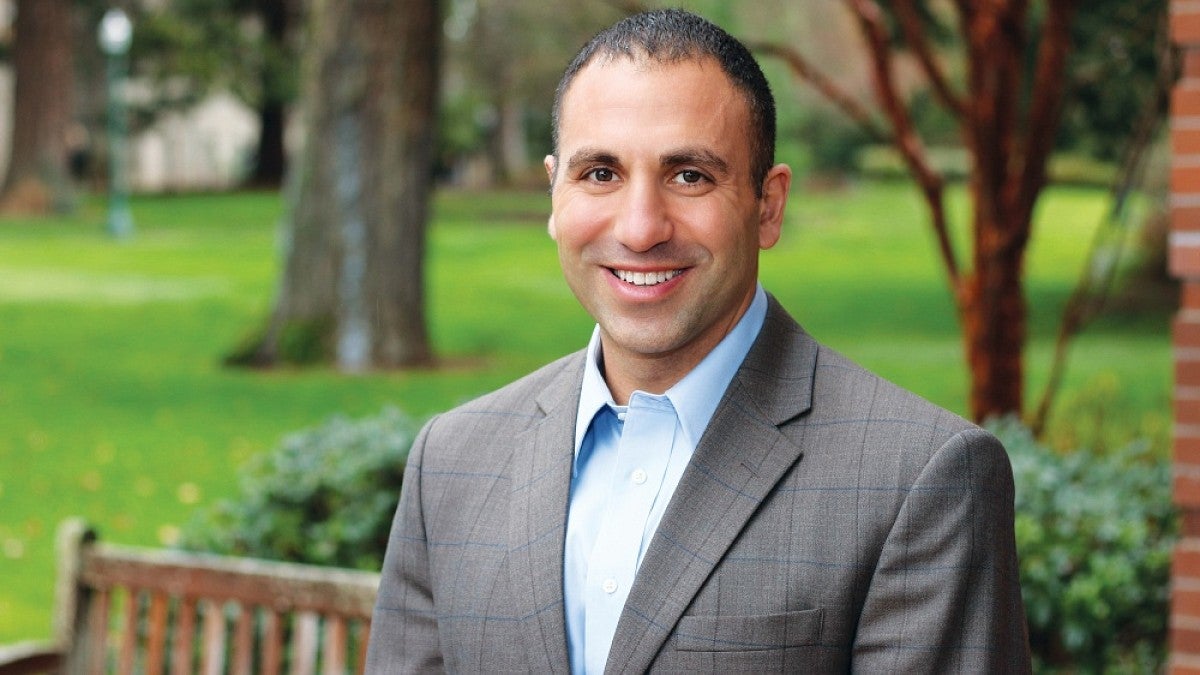Basketball superstar LeBron James wins wherever he goes. His teams have advanced to eight straight NBA Finals, and to date he’s won three.
But none of those teams would be considered among the league’s premier, winningest franchises — a team with a winning culture.
No, they’ve won because James is the best player on the planet.
“You can win that way, but not consistently,” said Josh Gordon, the undergraduate program manager at the Lundquist College of Business’s Warsaw Sports Marketing Center and an instructor of sports business.
Gordon breaks down numerous teams to see what constitutes a winning culture and why some teams can’t seem to build one in “The Sports Playbook: Building Teams that Outperform Year after Year.” It’s a business book about sports, but also a sports book about business.
“One thing we’ve learned is that people love sports, and they learn through them well,” he said. “Of course, all of these concepts translate back around to business.”
Gordon and his co-authors explore how culture enables some teams to consistently win over many years, whereas others languish in mediocrity. They looked at 65 collegiate, professional and Olympic teams, ranging from football to basketball, softball and tennis, among others.
“We try to see who sustains winning over a long period of time in a way that would defy talent alone,” Gordon said.
Gordon and his co-authors — Ken Pendleton, a former instructor in the UO School of Law who specializes in sports conflict, and Gary Furlong, who teaches at Queen’s University in Canada — made deep dives into the teams they write about. Gordon draws on personal experience, having done consulting work and embedding himself with a number of them.
Having spoken with players, coaches and front office staff, along with conducting surveys and applying other assessment tools, Gordon gained insights into what goes on outside the public’s eye.
He was shocked at how few organizations were getting it right.
“I was constantly going, ‘I can’t even believe this super-resourced, incredible organization with all the money in the world is making these fundamental flaws in how they’re treating their greatest asset: their human capital,’” he said. “It’s such a fertile opportunity to do better and not a very costly thing to implement. The human side is biggest variation between winning and losing because everything else gets neutralized.”
People often confuse harmony with culture. Building culture requires effort, and it requires aligning the goals of everyone within the organization. It requires making everyone see how helping the organization achieve its goals can also help them achieve theirs.
“There’s no shortcut to it, and it doesn’t happen organically,” he said.
Like successful businesses, he found that teams with winning cultures had mission statements that applied to everyone from the ticket sales workers to top executives.
He holds up the NBA’s San Antonio Spurs as a franchise that consistently outperforms the team’s talent levels. Management places a higher priority on hiring people who are a better fit over talent.
Another team they cover in the book is Germany’s 1960 Olympic gold medal-winning rowing team.
“They hated each other, absolutely hated each other,” Gordon said. “They couldn’t be in same room with one other than unless they were rowing. But they were in total alignment. They knew their roles, responsibilities. They rowed in unison and were dominant. And they hated each other.”
Gordon’s background is rooted in studying conflict and conflict resolution in a variety of settings, including sports. He came to the UO in 2010, joining a School of Law program combining both his areas of expertise. He later joined the Lundquist College of Business, teaching marketing and ultimately being appointed to his current post in 2013.
He started working on the book then, too, using research he’d done on how costly conflict is to an organization and drawing on his background in sports.
The book is geared toward university-level courses in sports management, sports psychology, organizational systems and sports business. But coaches and administrators at all levels of sports will find it beneficial, as would those in any organization whose culture needs work.
“One of the things we’re really trying to do is here is not tell someone, ‘Here is the culture that wins,’ but ‘Here is how you build a winning culture,’” he said. “You can’t just take ‘win the day’ and bring it over to South Eugene High School. You need to have your own unifying vision. Culture is the critical predictor of success for any organization, sports or otherwise, that needs to perform at a very high level.”
—By Jim Murez, University Communications


